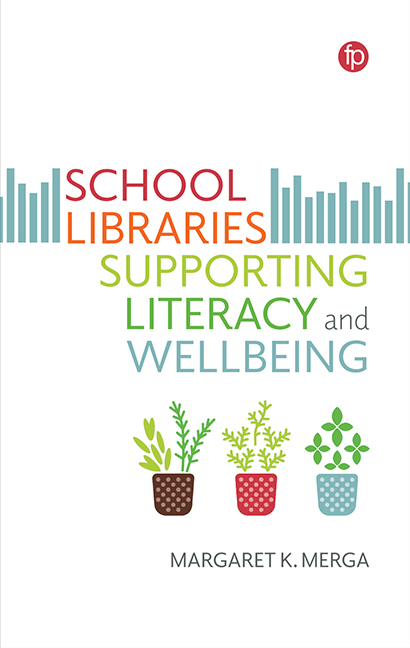Book contents
- Frontmatter
- Contents
- List of Tables
- Acknowledgements
- Abbreviations
- Introduction
- 1 What Do School Library Professionals Contribute to Student Learning and Support? A Focus on Australia and the UK
- 2 School Libraries and Reading Engagement for Literacy
- 3 Librarians Supporting Struggling Literacy Learners Beyond the Early Years
- 4 School Libraries and Reading Engagement for Student Wellbeing
- 5 School Libraries, Health Resourcing and Information Literacy
- 6 Librarians Creating Environments for Reading and Wellbeing
- 7 Challenges to Visibility and Advocacy for School Libraries and Staff
- Conclusions and Directions for Future Research
- Appendix 1 Background and Methods of My Research Projects
- Appendix 2 A Place to Get Away from It All: Five Ways School Libraries Support Student Wellbeing
- Index
3 - Librarians Supporting Struggling Literacy Learners Beyond the Early Years
Published online by Cambridge University Press: 21 April 2022
- Frontmatter
- Contents
- List of Tables
- Acknowledgements
- Abbreviations
- Introduction
- 1 What Do School Library Professionals Contribute to Student Learning and Support? A Focus on Australia and the UK
- 2 School Libraries and Reading Engagement for Literacy
- 3 Librarians Supporting Struggling Literacy Learners Beyond the Early Years
- 4 School Libraries and Reading Engagement for Student Wellbeing
- 5 School Libraries, Health Resourcing and Information Literacy
- 6 Librarians Creating Environments for Reading and Wellbeing
- 7 Challenges to Visibility and Advocacy for School Libraries and Staff
- Conclusions and Directions for Future Research
- Appendix 1 Background and Methods of My Research Projects
- Appendix 2 A Place to Get Away from It All: Five Ways School Libraries Support Student Wellbeing
- Index
Summary
When you read the title of this chapter, as a school library professional, certain students that you’ve worked with over the years probably came to mind as struggling literacy learners (SLLs). You have been in close proximity to the challenges they have faced as they have fallen further and further behind their higher-achieving peers as they move through the years of schooling, struggling to develop the literacy skills that support academic achievement.
I know there has been dissent about using the term ‘struggle’ in recent times, and I recognise that it can contribute to a homogenising deficit discourse that can obscure the strengths and differences within this group, but I am strategic in my choice of this term. First, like Lupo et al. (2019), I believe that ‘struggle is not a bad word, as there are benefits of overcoming the struggle of reading difficult texts with the right type of support’ (p. 558). Second, and perhaps most importantly, I am also concerned about more positively naming or framing these students in the literature, because on a pragmatic level it is already very hard to access sufficient support to meet the needs of these students (as we explore in detail in Merga et al., 2020a). Any change of nomenclature that downplays the difficulties these students experience could have the effect of further decreasing the likelihood that educators and schools will get adequate resourcing to support their needs, which as I explore herein, are complex and varied.
However, I know that these students are far more than this label. They have diverse intellectual capacities, as even highly intelligent students can fall into the SLL category when they experience issues that act as a barrier to their achievement, and each of these SLLs may also have diverse aspirations, talents and backgrounds. I conflate them as SLLs not to erase their uniqueness but rather to argue that there is a pressing need to concentrate resourcing on the needs of these students.
While SLLs are still forging basic but essential literacy skills, the focus of their learning experiences in school increasingly shifts to higher-order skills that they may not be able to access due to gaps in these foundational literacy skills.
- Type
- Chapter
- Information
- School Libraries Supporting Literacy and Wellbeing , pp. 57 - 82Publisher: FacetPrint publication year: 2022



